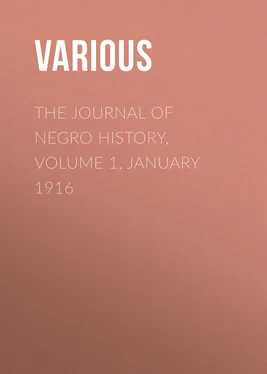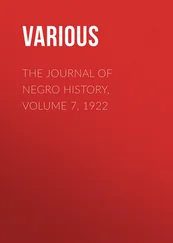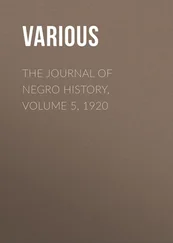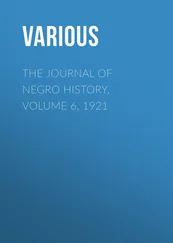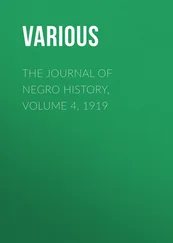Various - The Journal of Negro History, Volume 1, January 1916
Здесь есть возможность читать онлайн «Various - The Journal of Negro History, Volume 1, January 1916» — ознакомительный отрывок электронной книги совершенно бесплатно, а после прочтения отрывка купить полную версию. В некоторых случаях можно слушать аудио, скачать через торрент в формате fb2 и присутствует краткое содержание. Жанр: foreign_antique, periodic, История, foreign_edu, на английском языке. Описание произведения, (предисловие) а так же отзывы посетителей доступны на портале библиотеки ЛибКат.
- Название:The Journal of Negro History, Volume 1, January 1916
- Автор:
- Жанр:
- Год:неизвестен
- ISBN:нет данных
- Рейтинг книги:5 / 5. Голосов: 1
-
Избранное:Добавить в избранное
- Отзывы:
-
Ваша оценка:
- 100
- 1
- 2
- 3
- 4
- 5
The Journal of Negro History, Volume 1, January 1916: краткое содержание, описание и аннотация
Предлагаем к чтению аннотацию, описание, краткое содержание или предисловие (зависит от того, что написал сам автор книги «The Journal of Negro History, Volume 1, January 1916»). Если вы не нашли необходимую информацию о книге — напишите в комментариях, мы постараемся отыскать её.
The Journal of Negro History, Volume 1, January 1916 — читать онлайн ознакомительный отрывок
Ниже представлен текст книги, разбитый по страницам. Система сохранения места последней прочитанной страницы, позволяет с удобством читать онлайн бесплатно книгу «The Journal of Negro History, Volume 1, January 1916», без необходимости каждый раз заново искать на чём Вы остановились. Поставьте закладку, и сможете в любой момент перейти на страницу, на которой закончили чтение.
Интервал:
Закладка:
The children of Mrs. Richards were in no sense inferior to the descendants of the other families. She lived to see her work bear fruit in the distinguished services they rendered and the desirable connections which they made after the Civil War. Her daughter Julia married Thomas F. Carey who, after conducting a business for some years in New York, moved to Toronto, where he died. From this union came the wife of D. Augustus Straker. Her daughter Evalina married Dr. Joseph Ferguson who, prior to 1861, lived in Richmond, Virginia, uniting the three occupations of leecher, cupper and barber. This led to his coming to Detroit to study medicine. He was graduated there and practiced for many years in that city. Before the Civil War her son John D. Richards was sent to Richmond to learn a trade. There he met and became the lifelong friend of Judge George L. Ruffin, who was then living in that city. 77
The most prominent and the most useful person to emerge from this group of pioneering Negroes was her daughter Fannie M. Richards. She was born in Fredericksburg, Virginia, October 1, 1841. As her people left that State when she was quite young she did not see so much of the intolerable conditions as did the older members of the family. Miss Richards was successful in getting an early start in education. Desiring to have better training than what was then given to persons of color in Detroit, she went to Toronto. There she studied English, history, drawing and needlework. In later years she attended the Teachers Training School in Detroit. Her first thought was to take up teaching that she might do something to elevate her people. She, therefore, opened a private school in 1863, doing a higher grade of work than that then undertaken in the public schools. About 1862, however, a colored public school had been opened by a white man named Whitbeck. Miss Richards began to think that she should have such a school herself.
Her story as to how she realized her ambition is very interesting. Going to her private school one morning, she saw a carpenter repairing a building. Upon inquiry she learned that it was to be opened as Colored School Number 2. She went immediately to William D. Wilkins, a member of the board of education, who, impressed with the personality of the young woman, escorted her to the office of superintendent of schools, Duane Dotty. After some discussion of the matter Miss Richards filed an application, assured that she would be notified to take the next examination. At the appointed time she presented herself along with several other applicants who hoped to obtain the position. Miss Richards ranked highest and was notified to report for duty the following September. Early one morning she proceeded to her private school in time to inform her forty pupils of the desirable change and conducted them in a body to their new home.
Miss Richards taught in this building until 1871, when by a liberal interpretation of the courts, the schools were mixed by ignoring race distinction wherever it occurred in the school laws of Michigan. She was then transferred to the Everett School where she remained until last June when she was retired on a pension after having served that system half a century. Although she taught very few colored children she said to a reporter several years ago:
"I have never been made to feel in any way that my race has been a handicap to me. Neither my pupils nor the teachers have ever shown prejudice; I do not doubt that it exists; I shall be in Heaven long before it has all disappeared, but I say it is with a colored teacher as it is with a white one. Her work is the only thing that counts. I have never been called before the board for a reprimand in all my years of teaching. The methods have changed a good deal since the time that I started in and it would be easy to lag behind, but I try not to. It means continual reading and study to keep up with the modern way of doing things, but I manage to do it, and when the time comes that I cannot do my work in a satisfactory manner I want the Board of Education to discharge me and get some one else."
In testimony to these facts one of the daily papers of Detroit wrote her up in 1910, saying that she had kept her interest in modern pedagogic methods, maintained a high standard of scholarship in her school, and retained her sympathy with little children, who had rewarded her devotion to her work with their appreciation and love. To show how well she is loved by her pupils the writer was careful to state that these children as a gay group often surrounded her on her way to school, clinging to her hands, crowding about her as best they may, all chattering and pouring out accounts of their little doings. "Frequently," says this writer, "she is stopped on the street by grown men and women who long ago were her pupils and who have remembered her, though with the passing of the years, and the new classes of little ones who come to her every term, she has forgotten them." 78Many have been accustomed to bring their children to the Everett School and speak of how glad they will be when these little ones will be under the care of their parents' former teacher.
Miss Richards estimates that in the years of school work, she has had in her room an average of fifty pupils a term, although sometimes the attendance overflowed to a much greater number. With eighty-eight terms of teaching to her credit, the number of pupils who owe part of their education to "this gentle and cultured woman" amounts well up into the tens of thousands, enough to populate a fair-sized city.
We can not close this article with a better testimonial than the following letter from one of her former pupils, the Honorable Charles T. Wilkins, a lawyer and an influential white citizen, who addressed her on the occasion of her retirement last June.
" My dear Miss Richards : The friendship of so long standing between your family and mine, and the high esteem in which, as an educator, a woman, and a Christian, you were always held by my father the late Colonel William D. Wilkins, lead me to take the liberty of writing to congratulate you upon the well-earned retirement from active work, which I have just learned from the press that you contemplate after so many years well spent in faithful service to our community. As a citizen and one who has always been most interested in the education of our youth, I wish to add my thanks to those which are felt, if not expressed by the many who know of your devotion to and success in leading the young in the way in which they should go.
"Though your active participation in this work is about to cease, may you long be spared as an example to those who follow you is the earnest hope of
"Yours very sincerely and respectfully,
(Signed) "Charles T. Wilkins"
W. B. HartgroveThe Passing Tradition and the African Civilization
A close examination shows that what we know about the Negro both of the present and the past vitally affects our opinions concerning him. Men's beliefs concerning things are to a large extent determined by where they live and what has been handed down to them. We believe in a hell of roaring flames where in the fiercest of heat the souls of the wicked are subject to eternal burnings. This idea of hell was evolved in the deserts of the Arabian Peninsula where heat is one of the greatest forces of nature with which man has to contend. Among the native tribes of Northern Siberia dwelling in the regions of perpetual ice and snow, hell is a place filled with great chunks of ice upon which the souls of the wicked are placed and there subjected to eternal freezings. This idea of hell was evolved in the regions where man is in a continual battle with the cold.
The beliefs of Negroes concerning themselves have to a large extent been made for them. The reader no doubt will be interested to know that the prevailing notions concerning the inferiority of the Negro grew up to a large extent as the concomitant to Negro slavery in this country. The bringing of the first Negroes from Africa as slaves was justified on the grounds that they were heathen. It was not right, it was argued, for Christians to enslave Christians, but they could enslave heathen, who as a result would have an opportunity to become Christians. These Negro slaves did actually become Christians and as a result the colonists were forced to find other grounds to justify their continuation of the system. The next argument was that they were different from white people. Here we have a large part of the beginnings of the doctrine of the inferiority of the Negro.
Читать дальшеИнтервал:
Закладка:
Похожие книги на «The Journal of Negro History, Volume 1, January 1916»
Представляем Вашему вниманию похожие книги на «The Journal of Negro History, Volume 1, January 1916» списком для выбора. Мы отобрали схожую по названию и смыслу литературу в надежде предоставить читателям больше вариантов отыскать новые, интересные, ещё непрочитанные произведения.
Обсуждение, отзывы о книге «The Journal of Negro History, Volume 1, January 1916» и просто собственные мнения читателей. Оставьте ваши комментарии, напишите, что Вы думаете о произведении, его смысле или главных героях. Укажите что конкретно понравилось, а что нет, и почему Вы так считаете.
